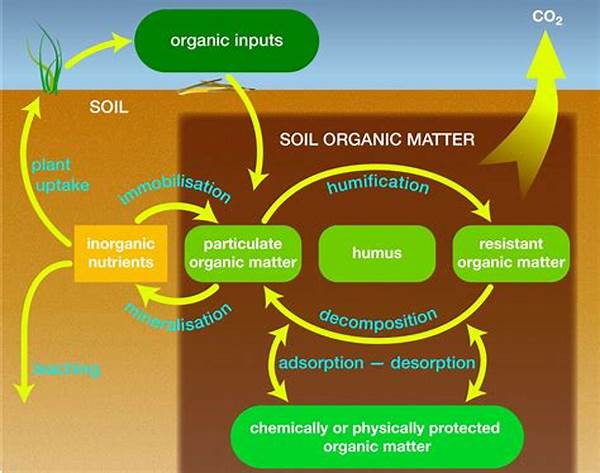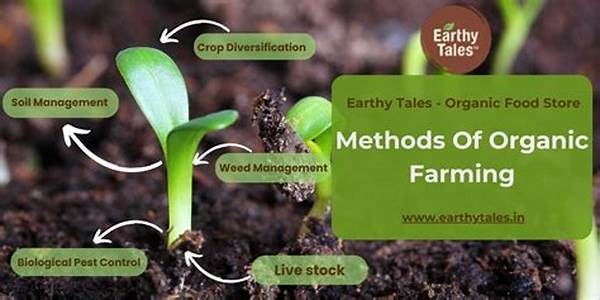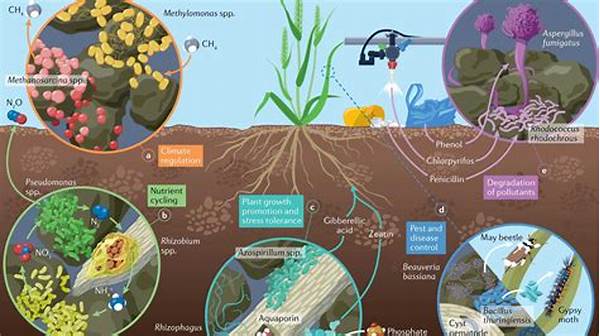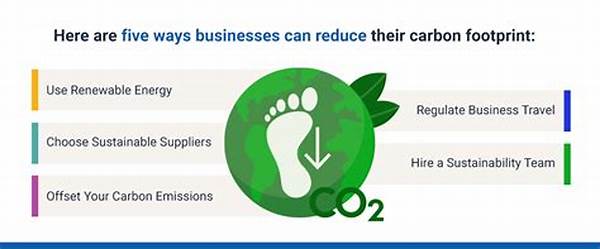The importance of the role of organic matter in soil is something that cannot be emphasized enough. In a world facing climate change, declining soil health, and escalating agricultural demands, the awareness and understanding of the role organic matter plays become crucial. Organic matter is the heartbeat of healthy, fertile soil, serving as a catalyst for productivity and sustainability. To ignore its role would be to sideline the very foundation of life that sustains our ecosystem. Embracing and enhancing organic matter in soil is the key to a thriving and resilient agricultural future. Let’s delve deeper into this essential topic and explore how organic matter not only transforms soil but invigorates life itself.
Read Now : Farm-fresh Produce Distribution Networks
Benefits of Organic Matter
The role of organic matter in soil is pivotal, extending benefits far beyond what meets the eye. First, it enhances soil structure by binding soil particles, which improves aeration and water retention. This translates to better root growth and superior plant yields. Second, organic matter acts like a sponge, reducing soil erosion caused by wind and water. Third, it provides a reservoir of nutrients essential for plant growth, releasing them slowly as needed. Fourth, organic matter facilitates the decomposition of plant residues and the waste of other organisms, recycling nutrients back into the ecosystem. Lastly, as a habitat for organisms, it supports biodiversity which drives the nutrient cycles, ultimately fostering a vibrant soil ecosystem. Turning a blind eye to the role of organic matter in soil would be detrimental to both crop and environmental sustainability.
How Organic Matter Enhances Soil Health
There are countless reasons to appreciate the role of organic matter in soil, but let’s focus on just a few that underline its importance.
1. Nutrient Supply: Organic matter supplies crucial nutrients, ensuring plants receive a steady diet, leading to robust growth and higher yields.
2. Moisture Management: It enhances the soil’s water-holding capacity, reducing irrigation needs and safeguarding crops during dry spells.
3. Carbon Storage: Organic matter is an influential factor in carbon sequestration, mitigating climate change impact by storing carbon in the soil.
4. Soil Structure: It improves soil structure, making it more pliable and easier for roots to penetrate, which promotes healthy plant development.
5. Biodiversity Support: Serving as a food source, organic matter is central to maintaining diverse soil organisms that lend to healthy soil ecosystems.
Increasing Organic Matter in Soil
The role of organic matter in soil is significant, but the challenge remains: how can we effectively increase its presence? Focused efforts in this direction are not just beneficial but necessary. By prioritizing organic amendments such as compost, green manures, and cover crops, we can significantly increase organic matter content. Not only do these practices enrich the soil, but they also offer a sustainable approach to farming. Additionally, reducing soil tillage and disturbance keeps organic matter intact, allowing it to break down naturally and integrate more deeply into the soil structure. It is imperative to adopt these methods widely to sustain agricultural productivity and counteract environmental changes.
Increasing organic matter in our soil is not just an environmentally sound practice but an agricultural imperative. Such actions lead to improved soil quality and greater resilience to environmental stressors, ultimately boosting crop yields. Supporting policies and practices that emphasize organic matter enhancement is a step we must commit to making for future generations. It’s time to revolutionize our agricultural practices, recognizing the profound role of organic matter in soil, and ensuring that we produce food in a manner that respects and preserves our planet.
Organic Matter and Climate Resilience
The role of organic matter in soil extends well into areas of climate resilience, acting as a foundation for weathering extremes. By enhancing a soil’s water retention and aeration, organic matter helps crops survive during prolonged dry periods and sudden downpours. Moreover, maintaining higher levels of organic matter improves resilience against soil erosion and nutrient leaching, crucial in an era of unpredictable weather. With climate change affecting crop viability, investing in the organic content of soil becomes not just beneficial but vital. It creates a buffer against adverse conditions, stabilizing agricultural yield and securing food supply chains.
Adopting practices that increase the role of organic matter in soil offers a pragmatic solution to building climate-resistant agriculture. Farmers and land managers can incorporate organic matter-rich amendments and cover cropping to create robust soil systems. Encouraging such practices on a broad scale could transform agricultural landscapes into carbon compounding resources, significantly offsetting greenhouse gas emissions. As we consider climate adaptation strategies, the inclusion of organic matter in soil deserves recognition as an unmatched tool in the battle against climate volatility.
Read Now : “organic Farming Regulatory Compliance Checklist”
Building Soil Fertility Through Organic Matter
The critical role of organic matter in soil cannot be overlooked when addressing soil fertility, which lies at the heart of agricultural success. Organic matter is the primary contributor of necessary nutrients like nitrogen, phosphorus, and potassium, ensuring that crops receive sustained nourishment. Through microbial activity, organic matter is broken down, gradually releasing nutrients to support ongoing plant health. This process transforms our view of soil from a mere growth medium to a dynamic ecosystem capable of balanced nutrient exchange.
Vital to this understanding is recognizing that the role of organic matter in soil directly influences microbial populations. These microorganisms are integral to nutrient cycling, forming symbiotic relationships with plant roots. Through these interactions, nutrient availability is increased, optimizing soil fertility and promoting robust crop growth. As we highlight the importance of organic matter, it becomes clear that fostering soil biodiversity is essential in maintaining fertility. By investing in the role of organic matter in soil, we pave the way for regenerative agriculture that benefits farmers and ecosystems alike.
Role of Organic Matter in Soil and Sustainable Agriculture
Sustainable agriculture hinges on our understanding and application of the role of organic matter in soil. When farmers integrate organic matter into their soil management practices, they embrace a system that promotes sustainability. Organic matter reduces the reliance on chemical fertilizers, which not only conserves resources but also aligns with environmentally friendly practices. This eco-conscious choice has long-term benefits, including healthier soils, increased organic crop demand, and support for local biodiversity.
Beyond environmental benefits, the role of organic matter in soil enhances the economic value of agricultural outputs. Healthier soil translates to higher-quality yields, meeting the growing consumer demand for organic and sustainably produced foods. Moreover, farms that focus on organic matter preservation often enjoy better resilience against market fluctuations, as healthy soil buffers against the unpredictability of climate impacts.
Sustainability, when emphasized through the role of organic matter, becomes not just a goal but a lived practice. Supporting policies that encourage organic matter enhancement is fundamental to ensuring the future of farming is diverse, sustainable, and productive. Now is the time to prioritize this approach if we are to safeguard our food systems and environment.
The Economic Impact of Organic Matter in Soil
The role of organic matter in soil holds tremendous potential for economic transformation within agriculture. Firstly, enhancing organic matter results in healthier, more nutritious crops, which command higher market prices. This is particularly true in the organic sector, where consumers are willing to pay a premium for produce grown sustainably.
Moreover, the improved soil structure resulting from enhanced organic matter minimizes natural resource expenditure. Better water retention reduces irrigation costs, and healthier soil requires less chemical intervention, cutting down on fertilizer expenses. Over time, the investment in organic matter can lead to increased profits, making it not just a sustainable choice but a financially sound one.
Organic Matter and Future Agricultural Policies
At the policy level, acknowledging the role of organic matter in soil should be a priority for future agricultural strategies. By promoting practices that increase organic matter, governments can stimulate agricultural sectors that are both sustainable and resilient. This involves incentivizing organic amendments, funding research into organic practices, and supporting education and outreach efforts.
A strategic shift towards enhancing organic matter content is poised to revolutionize agriculture, creating competitive and eco-friendly farming alternatives. As policy supports organic matter improvements, we can expect a cascading effect of benefits—from healthier environments to more dynamic economies globally. It is a call to action for policymakers to secure the future of agriculture with foresight and responsibility.



